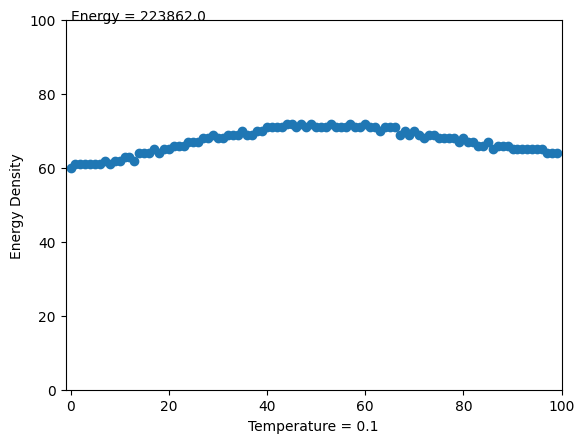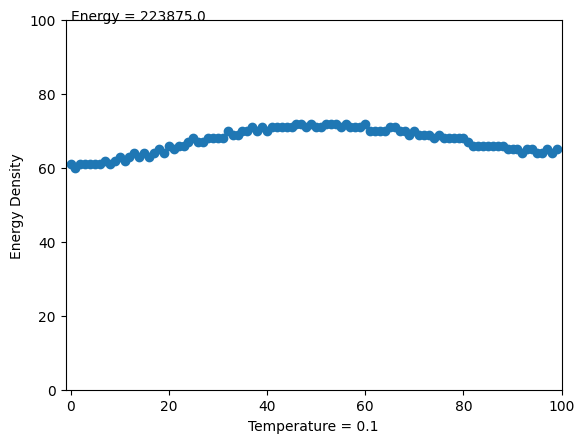Recap example: Monte-Carlo
Contents
Recap example: Monte-Carlo#
Problem: Implement and test a simple Monte-Carlo algorithm#
Given an input function (energy) and starting point (density) and a temperature \(T\):
Compute energy at current density.
Move randomly chosen agent randomly left or right.
Compute second energy.
Compare the two energies:
If second energy is lower, accept move.
\(\beta\) is a parameter which determines how likely the simulation is to move from a ‘less favourable’ situation to a ‘more favourable’ one.
Compute \(P_0=e^{-\beta (E_1 - E_0)}\) and \(P_1\) a random number between 0 and 1,
If \(P_0 > P_1\), do the move anyway.
Repeat.
the algorithm should work for (m)any energy function(s).
there should be separate tests for separate steps! What constitutes a step?
tests for the Monte-Carlo should not depend on other parts of code.
Use matplotlib to plot density at each iteration, and make an animation
NB. If you are using the Windows command prompt, you will have to replace all %%bash directives in this notebook with %%cmd
Exercise - Partial Solution#
We have given you a partial solution below. In the solution we have broken the problem down into pieces:
A function to generate a random change:
random_agent(),random_direction()A function to compute the energy before the change and after it:
energy()A function to determine the probability of a change given the energy difference (1 if decreases, otherwise based on exponential):
change_density()A function to determine whether to execute a change or not by drawing a random number
accept_change()A method to iterate the above procedure:
step()
Exercise: Fill in the gaps for testing
Input insanity: We have provided some unittests can provide a range of possible valid and invalid inputs. Add the production code necessary to handle these senarios elegantly.
We have provide the production code for
change_density()andaccept_change(). Add tests to ensure these functions work as expected. Consider these senarios:
change_density(): density is change by a particle hopping left or right? Do all positions have an equal chance of moving?accept_change()will move be accepted when second energy is lower?
%%bash
rm -rf DiffusionExercise
mkdir DiffusionExercise
Windows: You will need to run the following instead
%%cmd
rmdir /s DiffusionExercise
mkdir DiffusionExercise
%%writefile DiffusionExercise/MonteCarlo.py
import matplotlib.pyplot as plt
from numpy import sum, array
from numpy.random import randint, choice
class MonteCarlo:
"""A simple Monte Carlo implementation"""
def __init__(self, energy, density, temperature=1, itermax=1000):
from numpy import any, array
# ADD CODE HERE
# Sanitise your inputs
density = array(density)
self.itermax = itermax
self.current_energy = energy(density)
self.temperature = temperature
self.density = density
def random_direction(self):
return choice([-1, 1])
def random_agent(self, density):
# Particle index
particle = randint(sum(density))
current = 0
for location, n in enumerate(density):
current += n
if current > particle:
break
return location
def change_density(self, density):
"""Move one particle left or right."""
location = self.random_agent(density)
# Move direction
if density[location] - 1 < 0:
return array(density)
if location == 0:
direction = 1
elif location == len(density) - 1:
direction = -1
else:
direction = self.random_direction()
# Now make change
result = array(density)
result[location] -= 1
result[location + direction] += 1
return result
def accept_change(self, prior, successor):
"""Returns true if should accept change."""
from numpy import exp
from numpy.random import uniform
if successor <= prior:
return True
else:
return exp(-(successor - prior) / self.temperature) > uniform()
def step(self):
iteration = 0
while iteration < self.itermax:
new_density = self.change_density(self.density)
new_energy = energy(new_density)
accept = self.accept_change(self.current_energy, new_energy)
if accept:
self.density, self.current_energy = new_density, new_energy
iteration += 1
return self.current_energy, self.density
def energy(density, coefficient=1):
"""Energy associated with the diffusion model
:Parameters:
density: array of positive integers
Number of particles at each position i in the array/geometry
"""
from numpy import array, any, sum
# Make sure input is an array
density = array(density)
# of the right kind (integer). Unless it is zero length, in which case type does not matter.
if density.dtype.kind != "i" and len(density) > 0:
raise TypeError("Density should be an array of *integers*.")
# and the right values (positive or null)
if any(density < 0):
raise ValueError("Density should be an array" + "of *positive* integers.")
if density.ndim != 1:
raise ValueError(
"Density should be an a *1-dimensional*" + "array of positive integers."
)
return coefficient * 0.5 * sum(density * (density - 1))
Writing DiffusionExercise/MonteCarlo.py
import sys
sys.path.append("DiffusionExercise")
import numpy as np
from IPython.display import HTML
from matplotlib import animation
from matplotlib import pyplot as plt
from MonteCarlo import MonteCarlo, energy
Temperature = 0.1
density = [np.sin(i) for i in np.linspace(0.1, 3, 100)]
density = np.array(density) * 100
density = density.astype(int)
fig = plt.figure()
ax = plt.axes(xlim=(-1, len(density)), ylim=(0, np.max(density) + 1))
image = ax.scatter(range(len(density)), density)
txt_energy = plt.text(0, 100, "Energy = 0")
plt.xlabel("Temperature = 0.1")
plt.ylabel("Energy Density")
mc = MonteCarlo(energy, density, temperature=Temperature)
def simulate(step):
energy, density = mc.step()
image.set_offsets(np.vstack((range(len(density)), density)).T)
txt_energy.set_text(f"Energy = {energy}")
anim = animation.FuncAnimation(fig, simulate, frames=200, interval=50)
HTML(anim.to_jshtml())

%%writefile DiffusionExercise/test_model.py
from MonteCarlo import MonteCarlo
from unittest.mock import MagicMock
from pytest import raises, approx
def test_input_sanity():
"""Check incorrect input do fail"""
energy = MagicMock()
# What happens if the tempurture is Absolute Zero? Can any thing meaningful be calculated here?
with raises(NotImplementedError) as exception:
MonteCarlo(sum, [1, 1, 1], 0e0)
# Tempurture cannot be negitive
with raises(ValueError) as exception:
MonteCarlo(energy, [1, 1, 1], temperature=-1e0)
# What happens if we attempt to use a decimal density value?
with raises(TypeError) as exception:
MonteCarlo(energy, [1.0, 2, 3])
# What happens if we attempt to use a negitive density value?
with raises(ValueError) as exception:
MonteCarlo(energy, [-1, 2, 3])
# What happens if we attempt to use a 2D density array?
with raises(ValueError) as exception:
MonteCarlo(energy, [[1, 2, 3], [3, 4, 5]])
# What happens if our density array is too short?
with raises(ValueError) as exception:
MonteCarlo(energy, [3])
# What happens if our density array doesn't contain positive integers?
with raises(ValueError) as exception:
MonteCarlo(energy, [0, 0])
def test_move_particle_one_over():
"""Check density is change by a particle hopping left or right."""
from numpy import nonzero, multiply
from numpy.random import randint
energy = MagicMock()
# ADD CODE HERE
# Test mc.change_density() here
assert False
def test_equal_probability():
"""Check particles have equal probability of movement."""
from numpy import array, sqrt, count_nonzero
energy = MagicMock()
# ADD CODE HERE
# Test mc.change_density() here
assert False
def test_accept_change():
"""Check that move is accepted if second energy is lower"""
from numpy import sqrt, count_nonzero, exp
# Clue
energy = MagicMock()
mc = MonteCarlo(energy, [1, 1, 1], temperature=100.0)
# ADD CODE HERE
# Test mc.accept_change() here
assert False
def test_main_algorithm():
import numpy as np
from numpy import testing
from unittest.mock import Mock
density = [1, 1, 1, 1, 1]
energy = MagicMock()
mc = MonteCarlo(energy, density, itermax=5)
acceptance = [True, True, True, True, True]
mc.accept_change = Mock(side_effect=acceptance)
mc.random_agent = Mock(side_effect=[0, 1, 2, 3, 4])
mc.random_direction = Mock(side_effect=[1, 1, 1, 1, -1])
np.testing.assert_equal(mc.step()[1], [0, 1, 1, 2, 1])
Writing DiffusionExercise/test_model.py
%%bash
cd DiffusionExercise
pytest --cov || echo "test failed"
============================= test session starts ==============================
platform linux -- Python 3.8.18, pytest-7.4.4, pluggy-1.5.0
rootdir: /home/runner/work/rse-course/rse-course/module05_testing_your_code/DiffusionExercise
plugins: cov-4.1.0, anyio-4.4.0, pylama-8.4.1
collected 5 items
test_model.py FFFF. [100%]
=================================== FAILURES ===================================
______________________________ test_input_sanity _______________________________
def test_input_sanity():
"""Check incorrect input do fail"""
energy = MagicMock()
# What happens if the tempurture is Absolute Zero? Can any thing meaningful be calculated here?
with raises(NotImplementedError) as exception:
> MonteCarlo(sum, [1, 1, 1], 0e0)
E Failed: DID NOT RAISE <class 'NotImplementedError'>
test_model.py:12: Failed
_________________________ test_move_particle_one_over __________________________
def test_move_particle_one_over():
"""Check density is change by a particle hopping left or right."""
from numpy import nonzero, multiply
from numpy.random import randint
energy = MagicMock()
# ADD CODE HERE
# Test mc.change_density() here
> assert False
E assert False
test_model.py:48: AssertionError
____________________________ test_equal_probability ____________________________
def test_equal_probability():
"""Check particles have equal probability of movement."""
from numpy import array, sqrt, count_nonzero
energy = MagicMock()
# ADD CODE HERE
# Test mc.change_density() here
> assert False
E assert False
test_model.py:59: AssertionError
______________________________ test_accept_change ______________________________
def test_accept_change():
"""Check that move is accepted if second energy is lower"""
from numpy import sqrt, count_nonzero, exp
# Clue
energy = MagicMock()
mc = MonteCarlo(energy, [1, 1, 1], temperature=100.0)
# ADD CODE HERE
# Test mc.accept_change() here
> assert False
E assert False
test_model.py:72: AssertionError
---------- coverage: platform linux, python 3.8.18-final-0 -----------
Name Stmts Miss Cover
-----------------------------------
MonteCarlo.py 60 17 72%
test_model.py 45 12 73%
-----------------------------------
TOTAL 105 29 72%
=========================== short test summary info ============================
FAILED test_model.py::test_input_sanity - Failed: DID NOT RAISE <class 'NotImplementedError'>
FAILED test_model.py::test_move_particle_one_over - assert False
FAILED test_model.py::test_equal_probability - assert False
FAILED test_model.py::test_accept_change - assert False
========================= 4 failed, 1 passed in 0.68s ==========================
test failed
Complete Solution#
When you’ve attempted the exercise, have a look at this completed example solution.
don't look yet
ready?
%%bash
rm -rf DiffusionSolution
mkdir DiffusionSolution
Windows: You will need to run the following instead
%%cmd
rmdir /s DiffusionSolution
mkdir DiffusionSolution
%%writefile DiffusionSolution/MonteCarlo.py
import matplotlib.pyplot as plt
from numpy import sum, array
from numpy.random import randint, choice
class MonteCarlo:
"""A simple Monte Carlo implementation"""
def __init__(self, energy, density, temperature=1, itermax=1000):
from numpy import any, array
density = array(density)
self.itermax = itermax
if temperature == 0:
raise NotImplementedError("Zero temperature not implemented")
if temperature < 0e0:
raise ValueError("Negative temperature makes no sense")
if len(density) < 2:
raise ValueError("Density is too short")
# of the right kind (integer). Unless it is zero length,
# in which case type does not matter.
if density.dtype.kind != "i" and len(density) > 0:
raise TypeError("Density should be an array of *integers*.")
# and the right values (positive or null)
if any(density < 0):
raise ValueError("Density should be an array of" + "*positive* integers.")
if density.ndim != 1:
raise ValueError(
"Density should be an a *1-dimensional*" + "array of positive integers."
)
if sum(density) == 0:
raise ValueError("Density is empty.")
self.current_energy = energy(density)
self.temperature = temperature
self.density = density
def random_direction(self):
return choice([-1, 1])
def random_agent(self, density):
# Particle index
particle = randint(sum(density))
current = 0
for location, n in enumerate(density):
current += n
if current > particle:
break
return location
def change_density(self, density):
"""Move one particle left or right."""
location = self.random_agent(density)
# Move direction
if density[location] - 1 < 0:
return array(density)
if location == 0:
direction = 1
elif location == len(density) - 1:
direction = -1
else:
direction = self.random_direction()
# Now make change
result = array(density)
result[location] -= 1
result[location + direction] += 1
return result
def accept_change(self, prior, successor):
"""Returns true if should accept change."""
from numpy import exp
from numpy.random import uniform
if successor <= prior:
return True
else:
return exp(-(successor - prior) / self.temperature) > uniform()
def step(self):
iteration = 0
while iteration < self.itermax:
new_density = self.change_density(self.density)
new_energy = energy(new_density)
accept = self.accept_change(self.current_energy, new_energy)
if accept:
self.density, self.current_energy = new_density, new_energy
iteration += 1
return self.current_energy, self.density
def energy(density, coefficient=1):
"""Energy associated with the diffusion model
:Parameters:
density: array of positive integers
Number of particles at each position i in the array/geometry
"""
from numpy import array, any, sum
# Make sure input is an array
density = array(density)
# of the right kind (integer). Unless it is zero length, in which case type does not matter.
if density.dtype.kind != "i" and len(density) > 0:
raise TypeError("Density should be an array of *integers*.")
# and the right values (positive or null)
if any(density < 0):
raise ValueError("Density should be an array" + "of *positive* integers.")
if density.ndim != 1:
raise ValueError(
"Density should be an a *1-dimensional*" + "array of positive integers."
)
return coefficient * 0.5 * sum(density * (density - 1))
Writing DiffusionSolution/MonteCarlo.py
import sys
sys.path.append("DiffusionSolution")
import numpy as np
from IPython.display import HTML
from matplotlib import animation
from matplotlib import pyplot as plt
from MonteCarlo import MonteCarlo, energy
Temperature = 0.1
density = [np.sin(i) for i in np.linspace(0.1, 3, 100)]
density = np.array(density) * 100
density = density.astype(int)
fig = plt.figure()
ax = plt.axes(xlim=(-1, len(density)), ylim=(0, np.max(density) + 1))
image = ax.scatter(range(len(density)), density)
txt_energy = plt.text(0, 100, "Energy = 0")
plt.xlabel("Temperature = 0.1")
plt.ylabel("Energy Density")
mc = MonteCarlo(energy, density, temperature=Temperature)
def simulate(step):
energy, density = mc.step()
image.set_offsets(np.vstack((range(len(density)), density)).T)
txt_energy.set_text(f"Energy = {energy}")
anim = animation.FuncAnimation(fig, simulate, frames=200, interval=50)
HTML(anim.to_jshtml())

%%writefile DiffusionSolution/test_model.py
from MonteCarlo import MonteCarlo
from unittest.mock import MagicMock
from pytest import raises, approx
def test_input_sanity():
"""Check incorrect input do fail"""
energy = MagicMock()
with raises(NotImplementedError):
MonteCarlo(sum, [1, 1, 1], 0e0)
with raises(ValueError):
MonteCarlo(energy, [1, 1, 1], temperature=-1e0)
with raises(TypeError):
MonteCarlo(energy, [1.0, 2, 3])
with raises(ValueError):
MonteCarlo(energy, [-1, 2, 3])
with raises(ValueError):
MonteCarlo(energy, [[1, 2, 3], [3, 4, 5]])
with raises(ValueError):
MonteCarlo(energy, [3])
with raises(ValueError):
MonteCarlo(energy, [0, 0])
def test_move_particle_one_over():
"""Check density is change by a particle hopping left or right."""
from numpy import nonzero, multiply
from numpy.random import randint
energy = MagicMock()
for i in range(100):
# Do this n times, to avoid
# issues with random numbers
# Create density
density = randint(50, size=randint(2, 6))
mc = MonteCarlo(energy, density)
# Change it
new_density = mc.change_density(density)
# Make sure any movement is by one
indices = nonzero(density - new_density)[0]
assert len(indices) == 2, "densities differ in two places"
assert (
multiply.reduce((density - new_density)[indices]) == -1
), "densities differ by + and - 1"
def test_equal_probability():
"""Check particles have equal probability of movement."""
from numpy import array, sqrt, count_nonzero
energy = MagicMock()
density = array([1, 0, 99])
mc = MonteCarlo(energy, density)
changes_at_zero = [
(density - mc.change_density(density))[0] != 0 for i in range(10000)
]
assert count_nonzero(changes_at_zero) == approx(
0.01 * len(changes_at_zero), 0.5 * sqrt(len(changes_at_zero))
)
def test_accept_change():
"""Check that move is accepted if second energy is lower"""
from numpy import sqrt, count_nonzero, exp
energy = MagicMock()
mc = MonteCarlo(energy, [1, 1, 1], temperature=100.0)
# Should always be true.
# But do more than one draw,
# in case randomness incorrectly crept into
# implementation
for i in range(10):
assert mc.accept_change(0.5, 0.4)
assert mc.accept_change(0.5, 0.5)
# This should be accepted only part of the time,
# depending on exponential distribution
prior, successor = 0.4, 0.5
accepted = [mc.accept_change(prior, successor) for i in range(10000)]
assert count_nonzero(accepted) / float(len(accepted)) == approx(
exp(-(successor - prior) / mc.temperature), 3e0 / sqrt(len(accepted))
)
def test_main_algorithm():
import numpy as np
from numpy import testing
from unittest.mock import Mock
density = [1, 1, 1, 1, 1]
energy = MagicMock()
mc = MonteCarlo(energy, density, itermax=5)
acceptance = [True, True, True, True, True]
mc.accept_change = Mock(side_effect=acceptance)
mc.random_agent = Mock(side_effect=[0, 1, 2, 3, 4])
mc.random_direction = Mock(side_effect=[1, 1, 1, 1, -1])
np.testing.assert_equal(mc.step()[1], [0, 1, 1, 2, 1])
Writing DiffusionSolution/test_model.py
%%bash
cd DiffusionSolution
pytest
============================= test session starts ==============================
platform linux -- Python 3.8.18, pytest-7.4.4, pluggy-1.5.0
rootdir: /home/runner/work/rse-course/rse-course/module05_testing_your_code/DiffusionSolution
plugins: cov-4.1.0, anyio-4.4.0, pylama-8.4.1
collected 5 items
test_model.py ..... [100%]
============================== 5 passed in 0.55s ===============================

